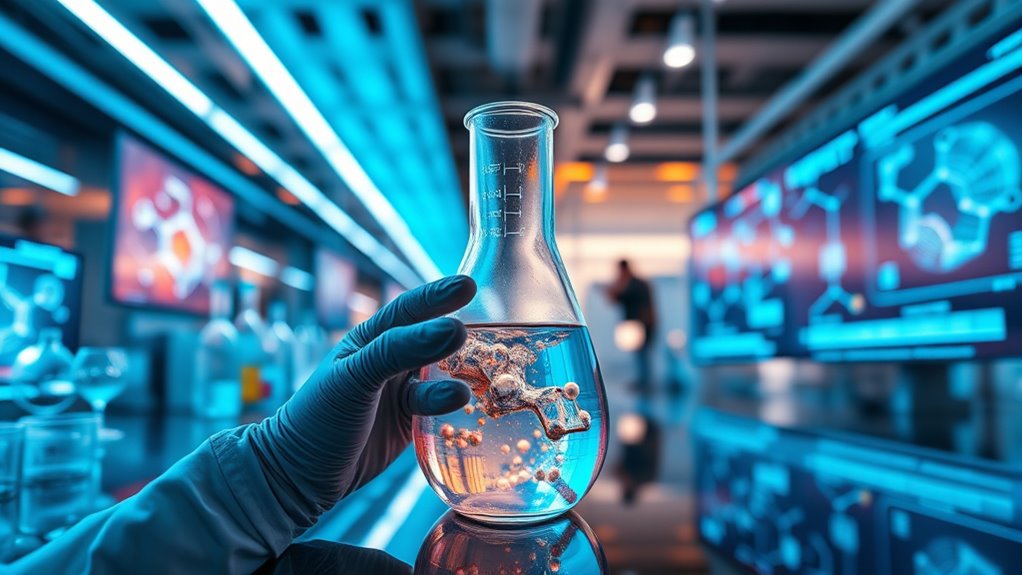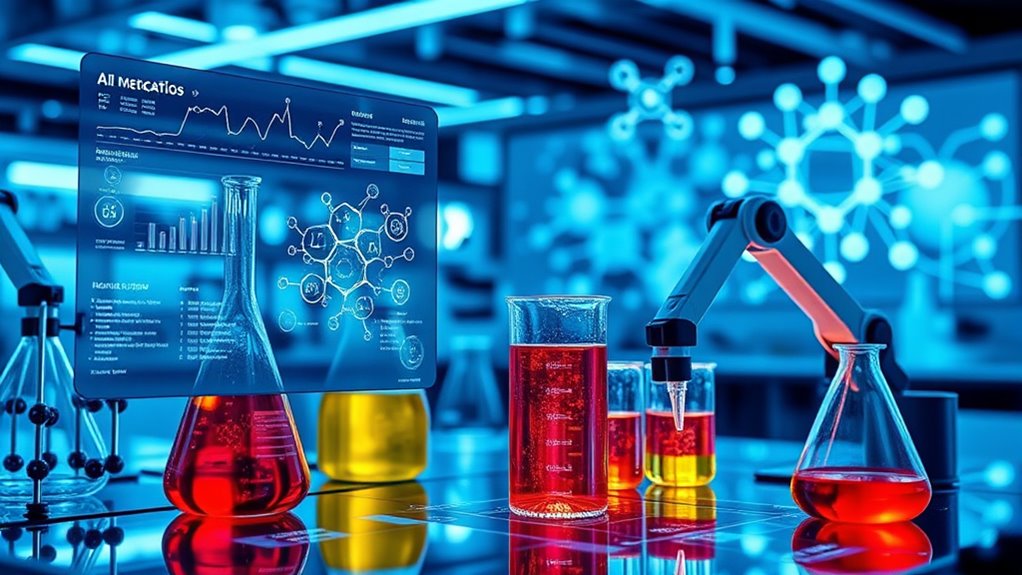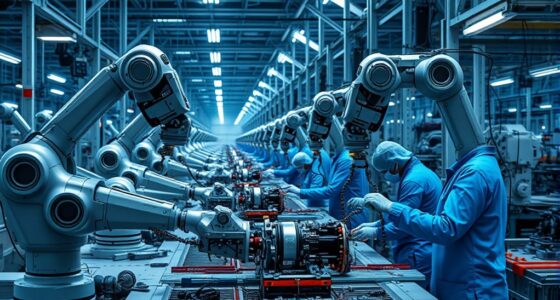AI tools in chemistry aren’t the final answer—they’re just the starting point for groundbreaking discoveries. They speed up research, help design new molecules, and optimize processes, all while supporting sustainable practices. However, these tools also raise ethical questions and require responsible use. As you explore further, you’ll see how AI’s role continues to evolve, opening new horizons for innovation and scientific progress that go far beyond initial applications.
Key Takeaways
- AI tools serve as catalysts for innovation, enabling new discoveries rather than final solutions in chemistry.
- They facilitate rapid hypothesis generation, guiding experimental research toward transformative breakthroughs.
- AI-driven insights promote sustainable practices and novel materials, shaping future scientific directions.
- These tools support interdisciplinary collaboration, opening pathways for ongoing scientific evolution.
- AI in chemistry is a foundational step, empowering researchers to explore uncharted scientific frontiers.
The Evolution of AI in Chemical Research and Development

The evolution of AI in chemical research and development has transformed how scientists approach discovery and innovation. It all began in the mid-20th century, when quantum mechanics was applied to molecular systems, aiming to solve complex Schrödinger equations. Limited computing power then meant approximations like semi-empirical methods and molecular mechanics had to suffice, enabling early simulations of molecular geometries and energies. These initial tools laid the groundwork for computer-assisted drug design but lacked the predictive power of today’s AI. Over time, advances in computational capacity and algorithms allowed for more sophisticated models. This progression set the stage for integrating AI and machine learning, markedly improving efficiency, accuracy, and the scope of chemical research, paving the way for the innovative breakthroughs seen in modern chemical R&D. This shift was facilitated by computational advancements that enabled the handling of increasingly complex chemical systems, and further developments in algorithmic techniques continue to expand the potential of AI-driven chemistry.]
Transformative Applications of AI Across Chemical Industries

AI has revolutionized chemical industries by enabling faster, more efficient innovation and process optimization. You can now discover new materials and formulations in months instead of years, thanks to AI’s accelerated research capabilities. Generative models require less data, making molecular design more sustainable and cost-effective, especially for biodegradable plastics. AI quickly screens compounds, speeding up chemical development while prioritizing eco-friendly options aligned with green chemistry. In process optimization, AI analyzes large datasets to improve yields, reduce waste, and cut energy use, delivering significant ROI. It also makes real-time adjustments to temperature and pressure, enhancing stability. Predictive modeling further refines process control by forecasting potential issues before they occur, minimizing risks and downtime. Predictive maintenance minimizes unexpected failures and downtime, saving costs. Meanwhile, AI-powered quality control monitors production, detects anomalies, and guarantees safety and regulatory compliance efficiently. This integration of AI into chemical workflows is further supported by advancements in hybrid modeling and simulation techniques, which continually enhance predictive accuracy and operational efficiency.
Challenges and Ethical Considerations in AI-Driven Chemistry

As chemical research increasingly relies on AI, ethical challenges and risks emerge that demand careful consideration. You must navigate dual-use issues where AI can create beneficial or harmful substances, like pesticides with both positive and negative impacts. Ensuring AI aligns with environmental sustainability and social good is vital for responsible innovation. Long-term effects such as chemical toxicity and environmental impact require ethical oversight. Accountability is essential—transparency in algorithms and decision-making helps maintain trust. To deepen your understanding, consider these points:
- Risks of AI-driven misconduct like data manipulation and plagiarism
- The importance of global ethical standards and researcher training
- Protecting human labor and creativity amid automation
- Developing proactive guidelines for responsible AI use in labs
Addressing these challenges helps foster ethical progress in AI-powered chemistry, especially considering AI vulnerabilities that can be exploited if not properly secured.
Metrics and Impacts of AI Integration in Chemical Innovation

The integration of AI into chemical research and manufacturing is transforming the industry at a rapid pace, with measurable impacts across innovation, efficiency, and market dynamics. You’ll find that 65% of chemical companies already use AI for process optimization, and adoption grew by 30% over the past two years. As a result, 80% report faster time-to-market, and 70% plan to increase investments, contributing to a market projected to reach $5.2 billion by 2030. AI accelerates R&D, with 60% driven by data analysis and a 45% boost in reaction prediction accuracy. It cuts costs by up to 50%, reduces waste by 40%, and lowers manufacturing expenses by 15%. AI-driven data visualization tools enable chemists to interpret complex data 35% faster, enhancing decision-making and process control. These metrics demonstrate how AI enhances chemical innovation, operational efficiency, and competitive advantage in the chemical industry.
Envisioning the Future: AI as a Catalyst for Scientific Breakthroughs

Envisioning the future of chemical research reveals a landscape transformed by rapid experimentation and discovery. AI accelerates cycles from decades to just years, enabling swift breakthroughs. You’ll see models like AlphaFold revolutionize protein folding, while AI-enhanced gene editing with CRISPR improves safety and speed. Material science benefits from AI-driven discovery of sustainable alternatives and alloys, cutting costs and innovation timelines. The integration of quantum computing with AI promises even faster molecular simulations, pushing boundaries further. Advanced computing enables more accurate and complex scientific models, further accelerating progress. Additionally, the development of integrated AI systems facilitates seamless collaboration across research disciplines, boosting overall efficiency and innovation.
Frequently Asked Questions
How Will AI Reshape the Roles of Human Chemists in the Future?
AI will reshape your role by shifting your focus from routine tasks to high-level analysis and interpretation. You’ll collaborate with AI to discover new compounds, optimize reactions, and design synthetic routes more efficiently. Your expertise in evaluating AI suggestions, applying domain knowledge, and making creative decisions becomes essential. Embrace new skills in data science and AI literacy to stay relevant, as your human insight remains irreplaceable in complex, nuanced chemical work.
What Are the Most Promising Emerging AI Technologies in Chemistry?
You should focus on emerging AI technologies like neural network potentials for rapid materials discovery, AlphaFold for protein structure prediction, and large language models for literature mining and hypothesis generation. These tools accelerate research, optimize reactions, and enable new insights. As you embrace these innovations, you’ll find they enhance your capabilities, making your work more efficient and innovative, ultimately transforming how chemistry research is conducted in the future.
How Can Small Labs Access AI Tools Effectively?
You can tap into AI tools without breaking the bank by using open-source options like Rxn Rover, which seamlessly integrates with your existing hardware. Cloud-based platforms like IBM RXN offer free or low-cost tiers that fit small labs’ budgets. Grants, collaborations, and national initiatives further democratize access. Plus, training and modular software make adoption straightforward, turning you into a pioneering researcher capable of groundbreaking discoveries with limited resources.
What Regulatory Changes Are Needed for Ai-Driven Chemical Innovations?
You need regulatory updates that streamline approval processes for AI-driven chemicals, ensuring safety and innovation. Focus on faster TSCA reviews, clear premanufacture notification protocols, and AI-specific hazard assessments. Regulations should safeguard worker safety and environmental protections while encouraging transparency and intellectual property rights. Collaborate across agencies like EPA, OSHA, and NIST to create harmonized standards, and include stakeholder input to adapt regulations as AI chemical innovations evolve.
How Do We Ensure AI Models Remain Unbiased and Reliable?
To keep AI models unbiased and reliable, you should regularly test them across diverse datasets representing different chemical and demographic groups. Filter out biased data during training, and apply targeted debiasing techniques to minimize errors affecting minority subgroups. Transparently report performance metrics, continuously monitor models in real-world scenarios, and incorporate ethical guidelines. This proactive approach helps you build trustworthy models that deliver accurate, fair results for all users.
Conclusion
Remember, tools are only as good as the hands that wield them. AI in chemistry isn’t the end goal but the starting point for breakthroughs you can achieve. Embrace these innovations with responsibility and imagination, knowing they can uncover new horizons in science. As the saying goes, “The journey of a thousand miles begins with a single step.” Take that step today, and shape a brighter, more innovative future in chemical research.









